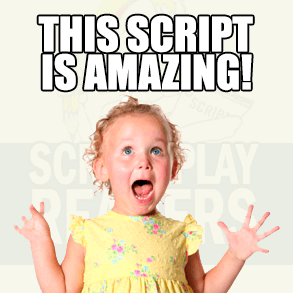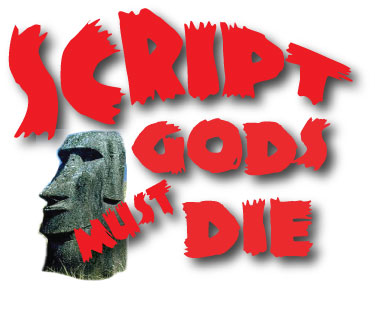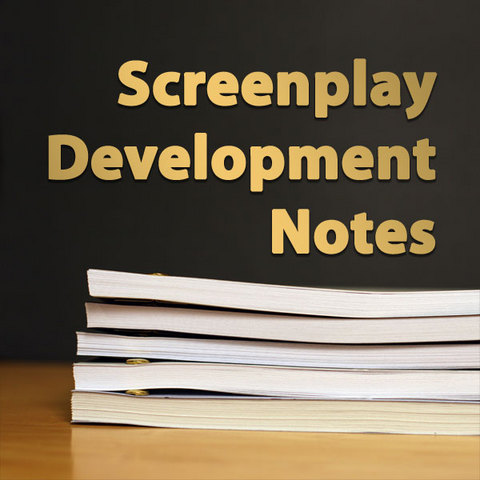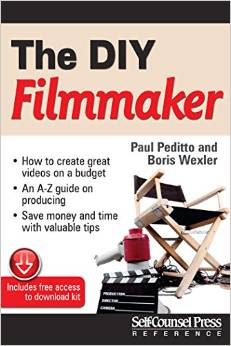
One of my all-time favorite articles is by a fellow you probably have never heard of, Allan Heifetz, who at one point in a pre-COVID world found himself making a buck as a script reader. The powers-that-be, the money people, the people with an actual vote on whether your script is actually made, are not reading your script until it clears multiple levels of readers. Readers are EVERYWHERE. You will not advance at any screenwriting contest, any production company, any agency, without the script getting some sort of thumbs-up from the withered and withering eyes of the Reader. Micro-Budget and DIY filmmaking makes the Reader somewhat less important. But, on any level, true liberation is at hand the day you no longer need other people’s money. If you have the money, shit, you can’t write your script in pink crayon. You can write it in COMIC SANS font. If you do not have the money, without an agent, without contacts, you’re doing it Old School, meaning you have to beat the Reader.
You’d think you’d want to get into the head of the Reader, like getting into the head of the enemy. Then…
Enter Allan Heifetz. This article puts you into that guy’s mind. Surprisingly, this is a really funny place to be. I found this article originally on Film Threat. Preserved here as well. Enjoy!
CONFESSIONS OF A GENIUS SCRIPT READER

“According to Quentin Tarantino, if a rookie screenwriter wants to get their script read by the right people in Hollywood they must first find a way to bypass the script readers. In the director’s eyes, a reader will never recommend you since they’re frustrated writers themselves and don’t want anyone else to succeed. Tarantino was killing me softly with his advice, telling my whole life, with his words, killing me softly. Yes, I do read scripts on occasion for extra cash and I’m also currently writing a script that I know everyone will hate and that I’ll never finish anyway. However, I assure you that we readers have nothing but respect for the show-offs who actually complete a script. It’s more accurate to say that we’re hoping your script is very, very, very bad.
You see, in the world of a script reader, the only thing worse than a bad script is a good script. If by some miracle I get a dreaded “quality” script then I have to go and explain exactly why it’s good and be all celebratory and nurturing and sincere. What a pain in the ass. A script reader’s job is supposed to be simple; you must reassure the client that the huge pile of scripts on his desk is pure trash and not worth considering. It’s just so cushy to coast on the tsunami of Final Draft excrement that flows my way… Alas, the nastiest comment I can get away with is a “The story lacks freshness”, or a “Doesn’t have the depth to fully explore the issues that it raises.”
Most people can’t write. Alas, it’s not my place to say such things or to decide what the public wants. After all, there seems to be a sizeable army of loonies who, after a long day of cackling in the street have managed to scrape together some complete sentences on their Apple II’s and, more incredibly, were able to dump their psychotic manifesto on a movie exec’s desk. To them I say congrats (and, no I don’t have any spare change), but when it comes to this grade of screenplay, one should interpret the list of “attached stars” on the cover page rather as a directory of people the author will systematically stalk and kill if no one returns his calls.
I’m not sure why Tarantino assigns us bottom feeders so much power… I’m well aware the job I’m doing could be done by any unpaid intern. However, I’d like to think I know what I’m talking about. I went to film school, ok? Need I say more? I think I just might know a little bit more about movies than Mr. and Mrs. Joe Stupid-ass out there. FYI: I make four to five grand a year doing this shit. You ever made that much scratch in such a miniscule period of time? Didn’t think so. So sit back and be schooled. Thanks to reading hundreds of examples of what not to do, I now know exactly how not to write a movie. And hey, isn’t that almost as good as knowing how to write one? In my book* it is. It’s high time I use my negative writing powers for the benefit of mankind. Allow me to steer you past the typical rookie mistakes that make readers like myself hate your script.
THE GOLDEN DONT’S
1. Voiceovers, Flashbacks and fourth wall breakin’: Don’t You Dare!
If you’re a beginning screenwriter looking to kick-start your saga with some empty gimmickry, your desperate mind will immediately run to old Auntie Flashback and Uncle Voiceover for help. Don’t do it. If you think you can use these shaky devices in a fresh and new way you’re wrong.
A flashback can be a dangerous thing in the hands of an amateur and unless you’re writing Memento II: Assignment Miami Beach, it’s a good idea to steer clear of them. Beginners love to send readers on a purposeless trek back and forth in time without contemplating the benefits or what the point is. All script readers suffer from chronic chronological whiplash because of these jokers. The worst offenders spend so much time in the past that the “present” becomes but a vague and distant concept that wecan never really grasp. Films like Memento and Pulp Fiction are guilty of convincing no-talent writers that the “present” is strictly squaresville. Perhaps I’m old-fashioned but I sort of dig the present; it’s where I spend a good hundred percent of my time. To quote Mr. Jesus Jones; right here, right now, there is no other place I’d like to be.
Voiceovers: nobody likes ‘em (see Bladerunner). In documentaries the voiceover can be a powerful tool (see Grizzly Man), but there’s something about fiction films that render VO’s unnecessary. A movie isn’t a book on tape with visual aid. If a few short lines of dialogue or a telling silent moment can speak volumes, why would an audience benefit from being told anything?
Newbies also love to break the fourth wall. These fools must think they have super strength. “Hulk smash fourth wall! Aaargh! Hulk need to address audience for lighthearted and wacky fun! Hulk’s rom-com is effervescent and delightful! Aargh!” Unfortunately, once you have a character address the camera you are essentially saying that your movie takes place in a magical fantasy land where anyone can talk to a theatre full of people from another dimension whenever one feels the need to vent.
What’s worse is that many writers use the fourth wall break only a handful of times only to drop it early on as if the main character eventually grew tired of sharing….
I’m sure that anyone can site instances where these gimmicks were used wisely, but why not err on the side of caution? You already have so many factors stacked against you, such as your inability to write. Why make it harder on yourself?
2. Swearing
Sometimes a script isn’t so much a screenplay, per se, as an excuse for the writer to use swear-words in really clever ways, i.e., “Halleh-fuckin-luyah!” Many writers specialize in crafting unique combinations of swears and/or inventing new ones like fucknuts, a recently discovered gem. Modern cuss artists are way too concerned with swearing and overestimate its importance as a communication tool. Sometimes their scripts even feature mini-discussions about swearing. My favorite example:
MAN #1
(insulting MAN #2)
Mother fuckin’ faggot!
MAN #2
Isn’t that a contradiction?
Touché. I love swearing, I assure you, but at a certain point, repeating the f-word isn’t writing, just swearing. After all, how many times can one say fucknuts before it loses all meaning?
3. Thesaurus Abuse
Some writers work hard on maintaining a rich and varied vocabulary palette from which to paint their story. Mixing things up word wise is certainly a good thing– for a book report or a term paper on Micronesia. Thesaurus-toting writers don’t understand how movies operate or where a film’s power comes from. With movies, however, an audience couldn’t care less if a character is articulate or the least bit intelligent. Your dialogue need not be eloquent, unique or even interesting. What matters is the psychological makeup of the character saying the words, as well as the circumstances in which he’s saying them. “Please pass the butter”, might be a dull phrase but if someone says it while wrapped in a straight jacket and writhing around in a padded cell, then maybe we’ll listen.
Thesaurus addicted writers never bother to visualize their characters saying their precious dialogue out loud, in a big screen context. Perhaps they subconsciously already know what we know; that their movie isn’t going to make it to the big screen, little screen, or even one of them crappy one inchers seen in the stands at football games.
If you must choose an alternative word, pick one that human beings have actually uttered within the last few hundred years. I always see fossilized words imbedded in dialogue that seem to have come directly from my 11th grade English class vocabulary list. Words like pneumatic, for example, which one particular author chose to repeat twice in the span of a page. I believe it was used thusly: “Oh, that’s so pneumatic, dude!”, and, “Way to be pneumatic, asswipe!”
4. Names and Titles
What’s in a name? A whole lotta nuthin. Let me list a few characters I’ve had the pleasure of meeting lately; Dusken, Melvah, Floridia, and Frederix. Pleased to meet you all; what ultra-pretentious planet do you hail from? Rule of thumb, if a particular character’s name can’t be found in a 50,000 Baby Names book, the writer has sadly succumbed to the name game, in which names of characters tend to have incongruous syllables forced together like Farken, Morfblatt and Gotvill. This name obsession is what ruined Fight Club for me. Tyler Durden? Yeah, right.
SULTRY VOICE (on phone)
My name’s Bambi Gamble.
BOBBY
That’s an interesting name.
Here we see the author congratulating himself on yet another kick-ass name. It takes the razor-sharp Bobby eighty pages to bring up the last name of his love interest.
BOBBY (to Felicia)
What kind of a name is Quattlebaum?
Is it Jewish? How quirky and hilarious!
6. Soundtrack Advice
Just as a script can deteriorate into a swearing dictionary it can also morph into a playlist of songs currently cramming up the author’s IPOD mommy got him for graduation. If the author is suggesting certain tunes at certain intervals throughout his script, we have gone in the wrong direction once again. For example:
EXT. CEMETERY – CONTINUOUS
Durden’s coffin is lowered into the ground as Poison’s Every Rose Has its Thorn gives the scene a sad, introspective mood.
INT. MOVIE THEATRE – WEEKS LATER
Frederix and Melissfah lean in for a passionate kiss. Lionel Richie’s Dancing on the Ceiling takes them to a higher romantic plane.
INT. KITCHEN – CONTINUOUS
Mr. Morfblatt lifts the toilet lid and unzips his pants as Cutting Crew’s, I Just Died in Your Arms Tonight wraps him and us in a soft ethereal blanky.
Just like books on tape with pictures, mix tapes with big screen visual accompaniment don’t make film producers drool with excitement. Producers will also not be willing to pay the ridiculous licensing fees for your kick-ass music wish list. However, if you’re Zack Braff and you get the green light for your upper middle class, 20-something white male project, you can literally have people in your movie telling you:
“You gotta hear this one song, it’ll change your life I promise you.”
-Natalie Portman to Zach Braff in Garden State
Here, Portman is really speaking for Braff the writer, who wants to share his incredible taste in music with us. So, in a sense, Braff is asking himself, “Hey! What music do I like?”, and answering with, “I’m so happy you asked. The Shins.”
7. Men Writing Women
To be fair, most no-talent writers aren’t sexually, emotionally or even plain ol’ regular retarded. The problem is that their scripts often tell a different story, revealing ugly unconscious desires and hang-ups that they probably didn’t want exposed. This is especially true of male writers who, left to their own devices, often unwittingly create an elaborate patriarchal fantasy world that they themselves rule with an iron penis. Finally they can do with womankind what they’ve always wanted to do. It must be said that even in so-called “quality pictures” you’ll find that the women characters are only there to be humped. If only pumpkins or bottles of Jergens could talk, eh fellas?
The male psyche is a terrible place to visit and we readers must make this journey regularly. I recently read a comedy script in which a group of guys go to Japan to teach English and end up starting a gigolo service where Japanese women pay to perform oral sex on the male prostitutes. Let me repeat that; the ladies would pay the guys to stand there and get blown. Hmmm…might the author have a schlong? In another script a woman confesses she had to “rub one out” in order to be calm enough for sex later. Is this Girlz Gone Wild? More like Girlz Gone Boyz.
Guys, if you’ve never had contact with the opposite sex you are hereby not allowed to put words or anything else for that matter in their mouths. You gotta write what you know and you know nothing, therefore I implore you to stick to these genres:
1. Sci-Fi (as in a movie set on a planet where all women have been eradicated).
2. Military Sagas
3. Prison Dramas
You say you haven’t been to jail or to the front lines? Hang out with your asshole friends for afternoon and record it. Your script is almost complete. If you insist on coming up with women characters then at least rent some Catherine Keener movies and get your mind blown. Listen, buddy, I’m on your side. I just don’t want you to let all our secrets out. Guy code, dude.”



